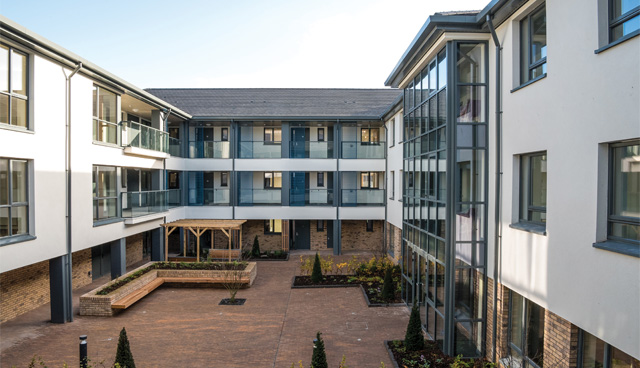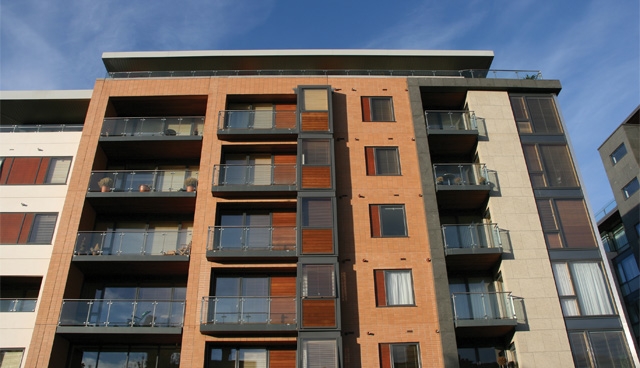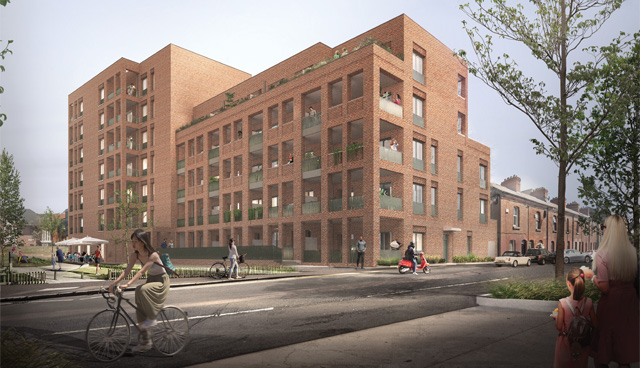
Ministers of State: Peter Burke TD & Malcolm Noonan TD
22nd July 2020
New Housing Minister: Darragh O’Brien TD
22nd July 2020Addressing the housing challenges of post-pandemic Ireland

Ireland will face many challenges over the next 20 years. One is clear — a likely recession triggered by the Covid-19 pandemic. As we know, recessions can have devastating effects on a country’s people, setting back key investment, often to the detriment of the most disadvantaged, writes John O’Connor, CEO of The Housing Agency.
As well as this, the world faces a climate crisis that, much like this pandemic, requires us all to adapt to survive. Ireland’s Climate Action Plan states that our carbon emissions need to fall by 24 per cent by 2030 from 1990 levels. This plan, along with international initiatives like the UN Sustainable Development Goals and the European Green Deal, give us some indication of the actions needed to address the climate crisis.
However, with each crisis there are opportunities. We can already see this on a local level. For example, local authorities making street spaces more pedestrian- and cyclist-friendly in response to the Covid-19 emergency.
From an environmental, public health and societal perspective, the way we address our current challenges is crucial. Innovative thinking and actions are required. We need to have a mindset of curiosity and imagination. We must take this chance to build a more sustainable society.
As mentioned in the foreword to this publication, The Housing Agency believes that a new long-term housing plan, which has broad societal and political support, is critical to effectively deliver a more sustainable and affordable housing system. Any new long-term policy must take into account both current and future challenges. The way we build housing can have a huge bearing on community, environmental and economic sustainability.
Priorities
With these challenges in mind, The Housing Agency believes that future housing policy in Ireland must:
- Learn from the last recession
We must continue and increase the delivery of housing. The urgent need for homes remains and Ireland must do all it can to meet this need through the building of public housing on a large scale while supporting broad delivery by the private sector.
The economic downturn of 2008 was largely fuelled by a property bubble. This time, that is not the case. Continuing construction creates jobs and helps address the social housing needs felt by our most vulnerable people, who in the past have unfairly felt the brunt of economic crises. - Promote the cost rental model
Cost rental homes, where the rent covers the cost of construction and ongoing maintenance, should be a key part of housing sector activity.
This model can provide stable rents that are affordable, secure tenancies through proper long-term management, and a sustainable funding model. It can also be a moderating influence to create broader housing affordability.
By targeting cost-rental homes at moderate-income households that experience financial difficulty in accessing housing or meeting the on-going cost of accommodation, these developments would complement ongoing social housing supply to ensure no-one gets left behind when it comes to having a secure and stable home.
Clúid Housing, Broome Lodge, Dublin 7: Older person housing scheme. 43 apartments designed for independent living, under the Universal Design Principles.
- Act fast to help people in mortgage arrears
The psychological toll felt by many who went through mortgage arrears in the last recession is still with us. Stories of households struggling with mortgage payments on negative-equity properties were widespread across our newspapers and TV screens. The devastating effects caused by this acute struggle cannot be repeated.With many currently finding it difficult to pay their mortgage, prompt and concerted action must be taken to provide immediate assistance, rather than a delayed response that only leads to increasing anxiety and fear over the loss of a home. - Prioritise energy efficient and climate friendly housing
We must double-down in our approach to addressing the climate crisis from a housing perspective. Cost-effective measures can and must be found to make homes climate friendly. There are three elements to this; where we build housing, having appropriate housing density and building the right types of homes. Sustainable quality standards, such as the Irish Green Building Council’s Home Performance Index, must be implemented for all State-funded residential projects.
The Covid-19 pandemic has shown us the impact major traffic reductions can have on our environment. Through sustainably placing housing in cities and towns, we can substantially reduce our country’s carbon footprint. Reducing our reliance on private cars by locating homes close to public transport and essential amenities will improve quality of life while contributing to a sustainable future.
High-density, sustainable homes, coupled with the facilities and infrastructure residents require in their daily lives, can lead to the regeneration of existing towns and cities to places with a better, more climate-friendly quality of life.“A national long-term housing plan will give greater certainty to all stakeholders in the housing sector and to citizens as they plan their future. Such a plan will facilitate implementation of the objectives of the National Planning Framework, which is hoped will run concurrently.”
- Adapt to new and existing technologies
Future plans must also be ready to adapt to new technologies that may emerge in the coming years. New technology may speed up housing construction and allow us to meet climate targets with greater ease and efficiency. Keeping an open mind on future developments will be crucial in developing quality homes in sustainable communities.
Ireland’s Climate Action Plan has set an ambitious target of retrofitting 500,000 existing homes and improving their performance so they have a Building Energy Rating (BER) of B2. This involves banning the installation of oil-fired boilers from 2022 and gas boilers from 2025. The plan has also committed to design a new delivery model for retrofitting, which will examine grouping large numbers of houses together to achieve economies of scale. The coordination and cooperation of local authorities, approved housing bodies and other important stakeholders will be crucial to achieving these goals. - Be mindful of biodiversity needs
Future housing must take into account the need to preserve and promote biodiversity. Open green areas that are allowed to grow wild, and landscapes that enable the growth of diverse plant and wildlife species are some of the ways in which construction projects can incorporate biodiversity into their projects.
These are just some of the factors which need to be included in any future housing policy in order for us to plan for a fair and sustainable future.
Key elements
The Housing Agency has contributed to both the Rebuilding Ireland Plan for Housing and Homelessness and the preceding Social Housing Strategy 2020. Based on this experience, the Agency would identify four key elements of a new long-term national housing policy:
- Delivery of housing by the public sector including social housing, cost rental and affordable purchase.
- Development of a cost rental sector (to provide affordable rental housing).
- Utilisation of State lands for housing.
- Delivery of housing by the development sector including rental housing and home ownership.
By actively using State land to deliver public housing, the public sector must start building homes on a large scale, using a mix of social housing, cost rental and, where appropriate, affordable purchase housing.

To do this, the master planning of development will be crucial. This would involve developing roads and infrastructure to allow parcels of land to be released and developed in turn, similar to the master planning for Adamstown and the Dublin Docklands. Delivering infrastructure ahead of development facilitates more sustainable growth, better communities, and greater certainty for all stakeholders.
A national long-term housing plan will give greater certainty to all stakeholders in the housing sector and to citizens as they plan their future. Such a plan will facilitate implementation of the objectives of the National Planning Framework, which is hoped will run concurrently.
However, it needs to be acknowledged that any housing policy of long duration will need all-party consensus to succeed. The policy, while setting out clear policy objectives, will have to allow for some flexibility in any given period to take account of economic, demographic or variable other factors.
The Housing Agency recommendations
A National Housing Policy and Plan agreed with a 20-year implementation period.
Build public housing on a large scale. The inclusion of cost rental alongside social housing will allow for development at scale while ensuring sustainable communities, with affordable purchase housing also included where appropriate.
Such long-term planning can work. We’ve seen this in the housing policies in countries such as Austria, Sweden and Denmark.
In Sweden, a national ‘housing for all’ policy, which began in the 1940s, favoured public and cooperative housing companies instead of private ones. With such a policy, the central government promoted the construction of larger housing developments while facilitating the rationalization of construction through larger scale planning, design and operation of housing schemes.
In Vienna, the city administration has pursued a consistent model of public owned housing since the end of the First World War which has resulted in State ownership of over 25 per cent of housing stock and the development of a limited profit sector which benefits from state subsidies which provides housing on a similar basis. This Vienna model of public housing provides almost 45 per cent of housing in the city and has kept housing affordable for the majority of Vienna’s citizens.
Conclusion
Ireland faces many challenges in the years ahead. How we respond to the economic difficulties imposed by the Covid-19 pandemic now will have long-term effects.
Decisions made now can show promise for a sustainable future. Through an ambitious long-term housing policy, we can provide many years of sustainability for our housing sector, while meeting the housing needs of our citizens in a way that is both affordable and sustainable for future generations.
T: 01 656 4100
E: info@housingagency.ie
W: www.housingagency.ie




